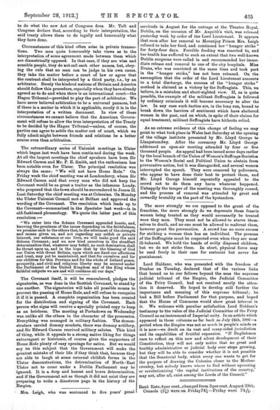Circumstances of this kind often arise in private transac- tions.
Two men quite honourably take views as to the interpretation of some agreement made between them which are diametrically opposed. In that case, if they are wise and sensible people, they do not call each other names, but, obey- ing the rule that no man can be judge in his own cause. they take the matter before a court of law or agree that the contract shall be interpreted by a third party, i.e., by an arbitrator. Surely the kindred nations of Britain and America should follow this procedure, especially when they have already agreed so to do and when there is an international court—the Hague Tribunal—provided to play the part of arbitrator. We have never believed arbitration to be a universal panacea, but if there is a. matter in which it is applicable, surely it is in the interpretation of a written document. In view of these circumstances we cannot believe that the American Govern- ment will refuse to allow the true interpretation of the Treaty to be decided by the Hague Tribunal—unless, of course, the parties can agree to settle the matter out of court, which we fully admit might between friends and relations be a better course even than arbitration.














































 Previous page
Previous page